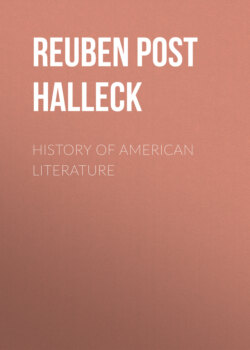Читать книгу History of American Literature - Reuben Post Halleck - Страница 22
На сайте Литреса книга снята с продажи.
SUMMARY
ОглавлениеIn this chapter we have traced the history of American colonial literature from the foundation of the Jamestown Colony until 1754. Before 1607 Chaucer, Spenser, and Shakespeare had written, and before 1620 the King James version of the Bible had been produced. England had, therefore, a wonderful literature before her colonies came to America. They were the heirs of all that the English race had previously accomplished; and they brought to these shores an Elizabethan initiative, ingenuity, and democratic spirit.
The Virginia colony was founded, as colonies usually are, for a commercial reason. The Virginians and the other southern colonists lived more by agriculture, were more widely scattered, had fewer schools, more slaves, and less town life than the New Englanders. Under the influence of a commanding clergy, common schools, and the stimulus of town life, the New England colony produced more literature.
The chief early writers of Virginia are: (1) Captain John Smith, who described the country and the Indians, and gave to literature the story of Pocahontas, thereby disclosing a new world to the imagination of writers; (2) William Strachey, who outranks contemporary colonial writers in describing the wrath of the sea, and who may even have furnished a suggestion to Shakespeare for The Tempest; (3) two poets, (a) George Sandys, who translated part of Ovid, and (b) the unknown author of the elegy on Nathaniel Bacon; and (4) Robert Beverly and William Byrd, who gave interesting descriptions of early Virginia.
The chief colonial writers of New England are: (1) William Bradford, whose History of Plymouth Plantation tells the story of the first Pilgrim colony; (2) John Winthrop, who wrote in his Journal the early history of the Massachusetts Bay Colony; (3) the poets, including (a) the translators of the Bay Psalm Book, the first volume of so-called verse printed in the British American colonies, (b) Wigglesworth, whose Day of Doom, was a poetic exposition of Calvinistic theology, (c) Anne Bradstreet, who wrote a small amount of genuine poetry, after she had passed from the influence of the "fantastic" school of poets; (4) Nathaniel Ward, the author of The Simple Cobbler of Agawam, an attempt to mend human ways; (5) Samuel Sewall, New England's greatest colonial diarist; (6) Cotton Mather, the most famous clerical writer, whose Magnalia is a compound of early colonial history and biography, sometimes written in a "fantastic" style; (7) Jonathan Edwards, America's greatest metaphysician and theologian, who maintained that the action of the human will is determined by the strongest motive, that the substance of this universe is nothing but "the divine Idea," communicated to human consciousness, and who could invest spiritual truth with the beauty of the Rose of Sharon and the Lily of the valleys.
The New England colonist came to America because of religious feeling. His religion was to him a matter of eternal life or eternal death. From the modern point of view, this religion may seem too inflexibly stern, too little illumined by the spirit of love, too much darkened by the shadow of eternal punishment, but unless that religion had communicated something of its own dominating inflexibility to the colonist, he would never have braved the ocean, the wilderness, the Indians; he would never have flung the gauntlet down to tyranny at Lexington and Concord.
The greatest lesson taught by colonial literature, by men like Bradford, Winthrop, Edwards, and the New England clergy in general, is moral heroism, the determination to follow the shining path of the Eternal over the wave and through the forest to a new temple of human liberty. Their aspiration, endeavor, suffering, accomplishment, should strengthen our faith in the worth of those spiritual realities which are not quoted in the markets of the world, but which alone possess imperishable value.
